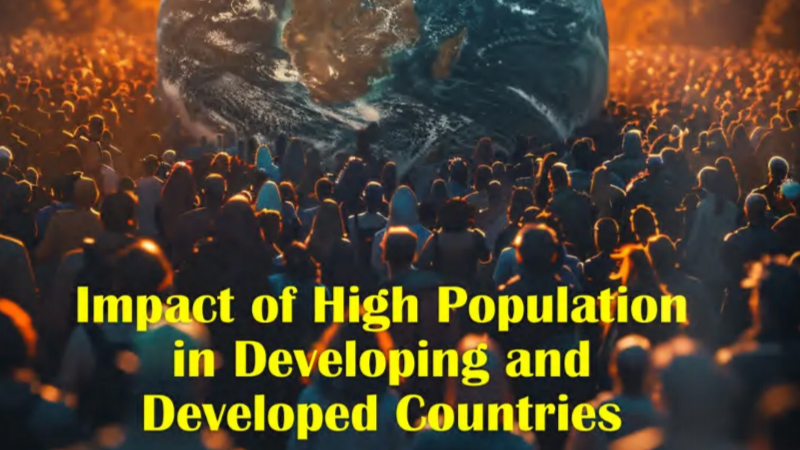Introduction:
Over the past century, the global population has surged at an unprecedented rate, leading to significant demographic shifts and posing numerous challenges worldwide. In 2021, the United Nations reported that the world population had reached approximately 7.9 billion people, with projections suggesting an increase to around 9.7 billion by 2050 (United Nations, 2021). This rapid growth is particularly pronounced in developing countries, where high birth rates and declining mortality rates contribute to significant population increases. These countries often struggle with limited resources, inadequate infrastructure, and insufficient social services, exacerbating issues such as poverty, malnutrition, and lack of access to quality healthcare and education. Consequently, the burgeoning population strains these already fragile systems, making sustainable development a critical yet daunting goal.
In developed countries, the population dynamics are markedly different, yet they also face significant challenges. These nations often grapple with aging populations, where a higher proportion of elderly individuals places considerable strain on social security systems, healthcare services, and the labor market. The demographic shift towards an older population necessitates innovative solutions to ensure economic stability and maintain a high quality of life for all citizens. Issues such as the shrinking workforce, increased healthcare costs, and the need for age-friendly infrastructure become more pressing. Additionally, developed countries must address the environmental impact of high consumption rates and waste generation, which are byproducts of their affluent lifestyles. Balancing economic growth with environmental sustainability and social equity remains a pivotal challenge for these nations.
From an Islamic perspective, addressing the complexities of population growth requires a framework that integrates ethical and religious principles. Islam emphasizes the importance of family, community welfare, and social justice, which should guide population control measures. Ethical family planning, education, and economic incentives are crucial components of this approach. Islam permits family planning methods that do not harm health and are mutually agreed upon by spouses, promoting the welfare of the family unit. Furthermore, education, particularly for women, plays a vital role in empowering individuals to make informed decisions about family size and childbearing. Economic policies that support smaller families without coercion can also be aligned with Islamic teachings, ensuring that population control strategies are humane, equitable, and respectful of religious values. This holistic approach underscores the necessity of integrating moral considerations with practical solutions to address the global population challenge effectively.
Impact of High Population in Developing Countries
1. Economic Strain: High population growth in developing countries often leads to economic challenges. Limited resources are stretched thin, resulting in inadequate public services and infrastructure. For instance, high population density in urban areas can lead to overcrowding, poor sanitation, and insufficient healthcare services (Smith, 2019).
2. Environmental Degradation: The increasing population exerts pressure on natural resources, leading to deforestation, loss of biodiversity, and increased carbon emissions. This exacerbates environmental issues, such as climate change and water scarcity, which are particularly detrimental to developing nations that often lack the resources to mitigate these effects (Jones & Brown, 2020).
3. Educational Challenges: High birth rates result in a young population that requires significant educational resources. In many developing countries, this leads to overcrowded classrooms, insufficient educational materials, and a lack of qualified teachers, ultimately impacting the quality of education (Miller, 2021).
Impact of High Population in Developed Countries
1. Aging Population: Developed countries face different challenges with high populations, such as an aging demographic. While the total population might not be growing rapidly, the proportion of elderly individuals is increasing, leading to higher healthcare costs and a need for more extensive social support systems (Williams, 2019).
2. Labor Market Implications: The aging population in developed countries impacts the labor market by reducing the workforce and increasing the dependency ratio. This necessitates policies to either extend the working age or integrate more young workers from other regions, which can lead to sociopolitical tensions (Garcia & Liu, 2021).
3. Resource Consumption: High population density in developed nations leads to substantial resource consumption and waste generation. This not only impacts the environment but also requires advanced technological solutions to manage waste and promote sustainable living (Harris, 2020).
Ways to Control Population Growth: Islamic Perspective
1. Ethical Family Planning: Islam permits family planning as long as it does not harm the physical or mental health of the spouse and aligns with mutual consent. The use of contraceptives is allowed to space births and ensure the well-being of the mother and children, provided it does not involve permanent sterilization (Rahman, 2018).
2. Education and Awareness: Promoting education, particularly among women, is crucial in controlling population growth. Educated women are more likely to make informed decisions about family planning and childbearing. Islam encourages the pursuit of knowledge, making education a vital component of population control strategies (Karim, 2020).
3. Economic Incentives: Providing economic incentives for smaller families can be effective. Islamic principles support the provision of financial stability and welfare for families, which can include incentives for those who choose to have fewer children (Abdullah, 2019).
4. Social Support Systems: Establishing robust social support systems can alleviate the pressures of high population growth. Islam emphasizes the importance of community support and welfare, suggesting that comprehensive social policies can help manage population growth sustainably (Ahmed, 2021).
Conclusion:
The global population size presents unique challenges for both developing and developed countries. While developing nations grapple with economic, environmental, and educational issues, developed countries face an aging population and resource consumption concerns. From an Islamic perspective, population control should be approached through ethical family planning, education, economic incentives, and
strong social support systems, ensuring that measures align with religious and moral principles.
References
1. Abdullah, R., 2019. Economic Incentives for Population Control in Islamic Contexts.
2. Ahmed, N., 2021. Islamic Principles and Social Support Systems for Population Management.
3. Garcia & Liu, X., L., 2021. Labor Market Effects of an Aging Population in Developed Nations.
4. Harris, J., 2020. Resource Consumption and Waste Management in High-Density Developed Regions.
5. Karim, S., 2020. The Role of Education in Population Control: An Islamic Perspective.
6. Miller, A., 2021. Educational Challenges in Overpopulated Developing Countries.
7. Naylor, R., Matson, P., 1993. Environmental impact of population growth. Eos, Trans. Am. Geophys. Union. https://doi.org/10.1029/93EO00254
8. Rahman, M., 2018. Islamic Views on Family Planning and Contraception.
9. Smith, J., 2019. Economic Challenges of High Population Density in Urban Areas.
10. Williams, K., 2019. Aging Population and Its Economic Implications in Developed Countries.
11. 2016. World Population Prospects. World Popul. Prospect. https://doi.org/10.18356/cd7acf62-en


